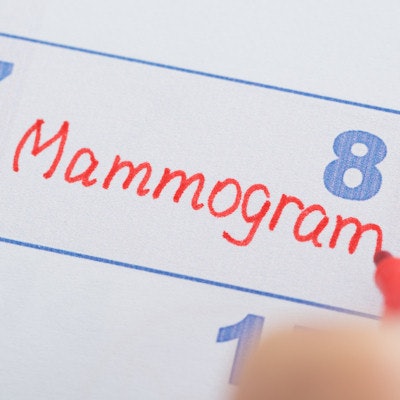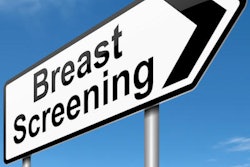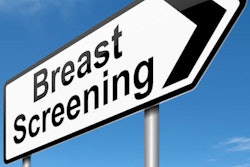
Fear is the top reason Maltese women avoid breast cancer screening, according to a new survey. To increase screening uptake, these women's fears must be addressed, although informing them about causes of breast cancer and its related risk factors would help too, the researchers found.
 Danika Marmarà, director of Cancer Care Pathways in Malta.
Danika Marmarà, director of Cancer Care Pathways in Malta.Fear of screening results and "illness perceptions" were the key reasons why women didn't respond to an invitation to have their first screening exam, according to a research team led by Danika Marmarà, director of Cancer Care Pathways in Malta. Researchers may be able to use the study results to tailor educational materials to improve screening attendance.
"This study suggests that illness perceptions together with women's health beliefs are significantly associated with first screening uptake and that their combination improves the prediction of nonattendance to breast screening -- this in itself was an unexpected outcome but a beneficial one to note," she wrote in an email to AuntMinnieEurope.com. "Thus, healthcare providers and policymakers do well by incorporating health beliefs and illness perceptions in the development of interventions, as this shall be instrumental in improving breast screening behaviors."
Study construct
Breast cancer accounts for 21% of all female cancer incidences in Malta with an average of 280 women diagnosed each year over the last decade. Despite evidence that breast screening decreases breast cancer mortality rates, breast cancer screening rates remain suboptimal in many European countries, including Malta, where less than 60% of women accept their first screening invitation, according to the study authors (BMC Public Health, 8 May 2017).
The Maltese national breast screening program mails breast screening invitation letters to women ages 50 to 66 years old every three years. Reasons why women don't accept the invitation have been presented in the literature and include health beliefs; illness representations; knowledge of breast cancer signs and symptoms, its causes and consequences, and recommended breast screening practices; sociodemographic factors; and health status, such as medical factors.
Marmarà and colleagues selected the Health Belief Model as one of the theoretical models for the current study as it is widely used to identify associated variables with mammography and guides the prediction of screening behaviors. It consists of the following six constructs:
- Perceived susceptibility: If a woman feels susceptible (vulnerable) to breast cancer or the risks of contracting the disease
- Perceived severity: If the woman believes in the seriousness of breast cancer and its consequences for the individual
- Perceived benefits: If she perceives more benefits than barriers from undergoing mammography
- Perceived barriers such as fear of the result or fear of the procedure
- Cues to action such as prompting from a doctor
- Self-efficacy such as arranging the appointment
However, the Health Belief Model only explains some variations in breast screening behavior, which is why an alternative model, the Common-Sense Model of self-regulation, developed by Leventhal and colleagues in the 1980s, has been used to consider the cognitive and emotional representations of an illness.
The researchers used both the Health Belief Model and the Common-Sense Model to understand how individual symptoms and emotions influence a woman's perception of breast cancer, such as its likely effect upon physical and psychosocial functioning, and to guide subsequent coping behavior. The components are identity, cause, timeline, consequences, cure/control, timeline cyclical, personal and treatment control, illness coherence, and emotional representations.
Fear is at fault
In their study of 404 women, the researchers found Maltese women have a high awareness of breast cancer signs and symptoms (> 80% agreement for seven out of eight signs), but wide variation about causation (e.g., germ or virus: 38.6% agree, 30.7% disagree). Fear was the key reason for not accepting the first screening invitation (41%) and was statistically significant across all subscale items (p < 0.05). Fear could be fear of the result, fear of pain, etc.
In the Health Belief Model, perceived barriers, cues to action, and self-efficacy were significantly associated with the first invitation to screen. Fear of the result and life problems were considered greater than the benefits of getting mammography.
Within the Common-Sense model, breast cancer causes, cyclical cancer timeline, and consequences also were significantly associated with not responding to an invitation to screening. Breast cancer was considered to be life-changing with serious financial consequences. No significant associations for sociodemographic or health status variables with uptake existed, except for family income -- women with a lower family income were less likely to attend screening.
Perceived barriers, in particular, were the strongest predictors of nonattendance to first invitation throughout the analyses (p < 0.05), but including illness representation dimensions improved the model's accuracy to predict nonattendance when compared with the Health Belief Model alone (65% versus 38.8%).
Looking forward
The study findings have been discussed with policymakers and screening physicians in Malta, as well as with clinical and research experts in Scotland, the home country of one of Marmarà's co-authors.
"Because I am currently performing further research on breast screening in Malta, the Maltese policymakers, screening leads, and public health educators shall be able to utilize the entire findings of this research to design culturally sensitive interventions for the first time in Malta to improve breast screening uptake based on evidence," she wrote.
Also, a pilot study is underway that follows up a cohort of Maltese women to explore the factors that lead women to seek out repeat screening exams, and to determine if accepting the first invitation to attend the screening program is a significant predictor for a woman to accept a second invitation.
Marmarà and her colleagues are also interested in exploring the different characteristics of women who undergo mammography screening during their lifetime in Malta.
"We are currently performing further analyses to explore the differences between those who attend for mammography and those who never attend during their lifetime," she wrote.



















